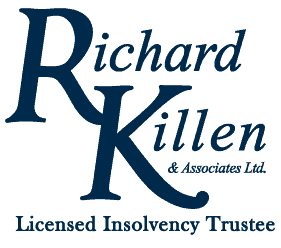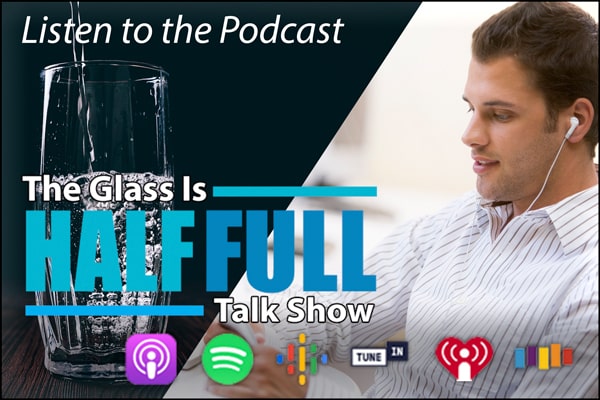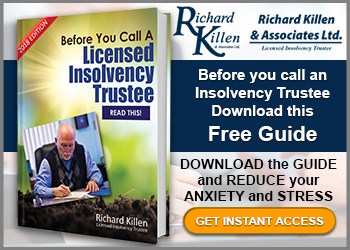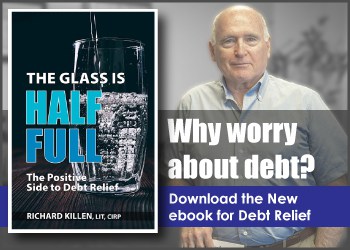2 Things You Can Do To Take Control of Debt

If you are struggling with debt, you are certainly not alone. Most Canadians, if not all, have debt. Some of us have just a little bit of debt and that’s completely normal, and we must know how to take measures to keep it at a manageable level and avoid becoming trapped in a cycle of debt.
On the other hand, there are also some of us who have a large amount of debt and it’s creating stressful financial issues as we try and juggle payments on the debts and put more effort into meeting the monthly payments on time.
And then there are a number of Canadians, unfortunately, who have out-of-control debt that has really become a burdensome problem and causing them to feel a deep sense of shame, guilt, and embarrassment to the point that they suffer physical and psychological health issues, such as anxiety and depression.
Managing debt is the very first step to prevent it from getting out of control. That’s really the rule of thumb when you take on credit. Once you take on any type of debt, it can affect your entire financial life. That’s why it’s so important that you take the steps towards being the one in control of your debt, instead of debt taking over your life. If you are in control of your debt, it will make you feel confident about being able to pay it off in a timely manner and you won’t be afraid about facing any financial demons over time.
Here are two important things to understand to help you always take control of your debt:
Know how much you owe.
Monitor your debt so that you are always aware of how much you owe. You monitor your debt simply by creating a detailed budget to plan your expenses. A budget will provide very important information for effective debt management. It will show you:
- The net income you have available to spend.
- What your regular expenses are (e.g. rent, childcare, food, transportation, savings).
- The total of the payments you have to make each month for your debts (e.g. credit card debts, mortgage, car loan and other loans).
Make sure you list each of your debts, one by one, indicating the total amount each creditor it is owed, the monthly payment you need to make, and when the due date is. Check your credit report to verify all your existing debts and to make sure you didn’t miss putting something on your list. Total up your expenses and payments and subtract this from your net monthly income. Depending on how much money you have left over at the end of the month, you’ll need to decide whether you have too much debt or if you feel comfortable with the level of debt you have now. Make it a point to update your debt list as you make payments on the due date. This will help you to stay aware of how much you owe all the time and prevent you from making any financial decisions that will lead to potential debt problems in future.
Recognize if you need help.
For some people, following a realistic budget to pay off debts and plan expenses is enough for them to take control of their debt. However, for others who have bigger debt problems and budgeting is not enough, there may be a need to create a manageable repayment plan to help you pay your debt and other bills each month in order to regain control of your finances.
As soon as you find that you’re struggling with payments and feel that you may have a potential issue on your hands, maybe you’ve made a late payment or think you’re not going to make a payment on time, reach out to your lender right away to find out if they can offer some ways for you to catch up or stay on time with payments. You’d be surprised that there are a number of creditors who are more than willing to work with borrowers who reach out to them for help before they are way behind on payments. Creditors may lower your interest rate, reduce your payment or even temporarily suspend your payments for a number of months until you get back on your feet. The key is not to wait until you’re delinquent because you have more options if you have no missed payments.
If you really cannot pay even the minimum payments on your debts or cannot even meet your basic monthly needs such as buy food or pay the electric bill, then your debt problems are more severe and you may need a more permanent solution to help reduce or eliminate your debts entirely.
At this point, the best thing you can do to take control of your debt is to talk to a debt professional. A licensed insolvency trustee is the only debt expert in Canada licensed by the federal government to give advice about other options for debt relief such as a debt management plan, a consumer proposal or a bankruptcy. Each of these debt solutions have advantages and disadvantages and a trustee will be able to explain each option thoroughly and answer any questions you may have. The trustee will do an in-depth assessment of your financial situation and be able to make recommendations on the best option to solve your debt problems. By getting the help you need, you can get back in the driver’s seat and take back control of debt with some good advice instead of ignoring your debt problem and making matters worse like leading you to declaring bankruptcy.
Taking control of debt is a commitment. You need to be able to manage it responsibly. Even if you have just a little bit of debt, you need to exercise restraint to keep it at a level you are able to manage. If you have more than just a little debt, you need a little more self-discipline to have more control over your debts. If you have more debt than you can handle, it would require you to seek the help you need and make certain sacrifices to get back on top of things.
Debt problems and financial challenges are inevitable in life. They will happen to each one of us at some level and at some point in our life. It’s important to realize that there are solutions to debt problems no matter how terrible your situation may seem to be. There is no need to spend your entire life in debt and allow it to ruin your other financial goals. All you need to do is make the decision to take control of debt and do all that is necessary to improve your financial situation.
Good and not-so-good debt: What’s the difference?
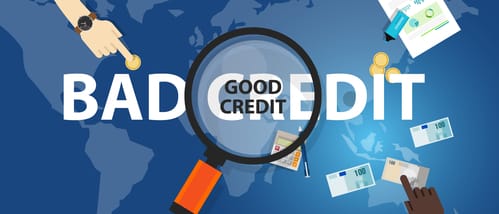
If you use credit with good judgment and with a solid plan to pay it off, you stand a good chance of profiting from the funds you borrowed. It’s important to remember that when it comes to taking on debt, you should approach the decision carefully and only take on debts that will grow your financial worth and/or positively affect your life. The best way to know how to control debt — along with most things in our lives — is to look before you leap. Be sure to ask yourself if the credit is necessary, what will it involve, is there a better way to get what you want than by incurring this debt and how fast will you be able to get rid of it. For example, ask yourself:
- What is its purpose, i.e. the long-term goals and benefits you will achieve as a result of taking on the debt?
- How you will pay it back?
- And, where it fits within your cash-flow budget?
One way to ensure that taking on new debt won’t be an issue for you is to understand the difference between good debt and not-so-good debt.
Good debt generally has the following qualities:
- It is taken on for something that will likely not lose value over time
- It will leave us better off in the long-term and provide us with lasting and, with luck, ever-increasing benefits
- The debt will not have negative consequences on our present and near-future overall financial position
- It will help us manage our finances more effectively
- It will help leverage your wealth
- The debt is used in a responsible way, with details carefully thought out and with the long- term view in mind
- There is a clear and specific reason for taking out the debt
- There is a realistic plan for paying back the debt as quickly as possible
- The debt was obtained through the cheapest and most effective borrowing method available, with the most reasonable interest rate, term and charges
Not-so-good debt has the following features:
- It feels like free money
- It often provides some form of instant gratification
- It will not provide some increase in value to us over time
- It reduces your wealth or offers no opportunities to grow wealth
- It keeps growing, because of the interest rate and supplementary charges
- It seems like it will never be paid off
- It may have an unrealistic repayment plan
How to stay out of debt
The fact is that no matter how much our financial life may have jumped the rails, you always have the power to get it back on track, regain control and avoid debt situations like bankruptcy. You’ve also seen how much of a role our attitude plays in grasping that empowerment. Seeing the glass to be half-full rather than half-empty can make all the difference in the world. If you can manage your credit wisely, you can enjoy the many benefits it offers. As you know, it can be a very useful tool by helping you accomplish important life goals, boost your net worth over time and enhance your quality of life, just so long as you remain the one in charge.
The next logical question likely is: “What can I do to make sure that I do remain the one in control of my debt?” Of course, the short flippant answer is: don’t borrow. But as we’ve already seen, there are times that taking on debt will be necessary. The majority of us may see abstention as too lofty a goal. It can be done, but very few of us will be in the envious financial position of having the money to satisfy all our needs, and our wants, without borrowing. The trick will be to manage it properly and not allow it to take control.
Consider sticking the following reminders to your fridge to help keep you on the straight and narrow in 2019:
- Best way is to stay out of debt completely, don’t borrow full stop. But some are not avoidable:
- Mortgages
- Car loans
- Student Loans
- Impulse — clothing, food, entertainment
- f you actually need to take on some debt, what is it that you are trying to accomplish?
- Have a plan – this is the goal of how you’ll pay of the debt
- Develop good habits and stick to positive financial routines
- Most important, learn to manage your cash flow
- Create a simple cash flow spreadsheet or table; this can also be done through money management software like Intuit Quicken or MS Money
- Make tracking your money an automatic process; enter and update your transactions regularly
- Remember, when it comes to tackling your debt:
- Be honest with yourself about what went wrong
- Make a decision to tackle the problem
- Seek professional advice to understand your options; remember, you’re not alone, keep your pride in check
- Accept the reality of the situation and stay positive
- if it becomes too much for you to handle, never be afraid to consult with a debt expert or professional.
A Person in Toronto Asks -Should I Go Bankrupt?
In this video, Richard Killen, a Licensed Insolvency Trustee in bankruptcy with offices across Toronto answers the question.
I don’t know how many times I have been asked by somebody during the course of the free consultation we provide to consumers at the beginning. What do you think, should I go bankrupt?
My answer is always the same for people. Its not up to me to tell you to go bankrupt.
Bankruptcy is a personal decision. What might work for one person, might not work for another person. Although what you can get from a trustee is a good idea of what is going to happen if you do a bankruptcy opposed to a consumer proposal.
So to answer the question, should I go bankrupt? My answer is you need to decide that.
What happens to my tax refund in a bankruptcy or consumer proposal in Brampton?
In this video, Richard Killen, a Licensed Insolvency Trustee in Ontario with offices in Durham region (Pickering & Oshawa) talks about whether a person’s income tax debt can be included in a personal bankruptcy in Ontario.
Something that comes as a big surprise to a lot of people is when they find out an income tax debt, an ordinary income tax debt is something that is dischargeable in a bankruptcy or can be taken care of in a consumer proposal. The people of Durham or people from across the Greater Toronto Area ask me that question numerous times. It is not a strange thing as ordinary income tax debt is treated as a debt.
There is nothing special about the fact it is a debt owed to the government. A debt to the government is not anything special in a bankruptcy situation. Therefore, in a bankruptcy in Durham or anywhere in Ontario, a tax debt is dischargeable.
If you are behind on your taxes or are have other debt problems, consider talking to one of our trustees and debt experts. We can help you review all your options for debt relief.
Contact our Durham office us for a fresh start at (905) 420-6565
Is A Payday Loan A Good Idea?
In this video, Richard Killen, a Licensed Insolvency Trustee in Bankruptcy Scarborough talks about whether a Payday loan is worth considering.
I guess one can say that going into debt, any kind of debt, is hardly ever a good idea. Usually, the cost of the debt outweighs whatever benefits you may get from borrowing the money. However, sometimes debts make a good case for making some worthwhile. For instance, is a mortgage worthwhile? Because you borrow a large amount of money for buying a house, you are going to pay back that money with interest but the house will appreciate in value. And over time that appreciation more than outweighs the cost of the debt. Maybe that kind of debt is a good idea.
Ultimately, it always boils down to whether the cost too much and how much is the cost? Now there is going to be interest on any loan and that is what you must consider. Now, unfortunately, Payday loans are on the high end of all interest calculations so one can say that it is tough to say if a Payday loan is worth it.
If a Payday loan is a part of your coping with bills, you should consider having a consultation with one of our trustees. It may be the most stress relieving call you make this year.
Is your credit rating affected?
In this video, Licensed Insolvency Trustee in the GTA area, Richard Killen, talks about the how your credit rating will be impacted by your current financial situation and is not directly due to the fact that you are undergoing bankruptcy or a consumer proposal. As a matter of fact, it is the solution you need to get out of your financial troubles and start improving your credit rating.
Here are a few key takeaways from Richard’s informative clip:
- Of course, a person’s credit rating is affected, but not so much by the bankruptcy or consumer proposal itself. It’s the non-payment of the debts that negatively affects your credit rating.
- Most people who go bankrupt or do a consumer proposal have already fallen behind in payments and their credit rating is already diminished.
- One thing for sure: the only way to restore your credit rating is by taking care of the immediate problem- and that‘s where the bankrupt or consumer proposal does the job.
- Think of a bankruptcy or a consumer proposal as the solution, not the problem.
Should you still feel uneasy about your debt and losing your assets, it’s definitely worth it to give a Licensed Insolvency Trustee a call or a visit so that they can give you all the information you will need to make this important decision and also to alleviate any worry and stress you may have.
There is no cost for your initial meeting and we will explain all of your options to you. We can meet with you during business hours or book after hours appointments if that is more convenient. Richard Killen and Associates is a Licensed Insolvency Trustee in bankruptcy Scarborough and have 10 locations across the Greater Toronto Area. Call us at (416) 285-9511
Christmas Credit Hangover
In this video, Richard Killen, Licensed Insolvency Trustee in bankruptcy in Toronto talks about buying Christmas gifts on credit cards.
It is important to remember that credit card bills don’t take a Christmas holiday. Christmas brings out the “giving” in us, especially when we have children or grandchildren. There is nothing wrong with giving, but remember, the piper will always have to be paid.
Licensed Insolvency Trustees tend to be very busy in January when the credit card bills come in. Don’t let yourself fall into that trap.
Should you find yourself in debt and your monthly bills exceed your monthly income, maybe it is time to have a conversation with Richard or one of the other trustees in bankruptcy. Call us at (416) 285-9511
Are You in Debt Denial?
 Are we just fooling ourselves.? Sure you’re carrying a balance month to month on your credit card, have car payment and a substantial mortgage on your house. But this is normal, right?
Are we just fooling ourselves.? Sure you’re carrying a balance month to month on your credit card, have car payment and a substantial mortgage on your house. But this is normal, right?
No, not necessarily. There’s a good chance you’re fooling yourself. While carrying a balance on your credit card may be par for the course these days, consumer credit rate site RateSupermarket did a poll of 6,000 Canadians and discovered that “27.5% of respondents [were] wrong in how they perceive their debt, with 22% mistakenly believing they owe less than the national average.”
According to RateSupermarket editor Penelope Graham, “Canadians want to believe their credit habits are sustainable and responsible. However, 42% of those who believe their debt is on par with the average are actually carrying more than the norm.”
The flip side of this is that 35.4% of people polled believed they had too much debt when it was actually lower than their peers.
An infographic put together by RateSupermarket points out that the average credit card debt in Canada is $2,627 and that 46% of people who believe they have normal credit card debt have balances exceeding $8,000.
Apparently it’t time for many of us to take a reality check. To overcome debt denial, it’s time to look at your real numbers in black and white. Check your credit card statements, loan papers and bills in arrears and put down on paper how much you owe whom.
You’ll be surprised. Many of us underestimate the size of our debt. Then prioritize your debts by size and urgency and start paying them off.
If you find that the size of your debt has become overwhelming, you may need some sound advice. Come in to a free first meeting at Richard Killen & Associates. We will assess your situation and give you your options.
You’ll know exactly where you stand and what you can do about it. There will be no need to fool yourself.
Do I Need to Meet My Creditors?
The last people you want to meet when going through a bankruptcy in Ontario is your creditors, right? You know, the people who have been sending you notices, phoning you non-stop, garnisheeing your wages and generally making your life difficult.
What are the chances you will have to get face to face with people who definitely aren’t part of your fan club? The chances are very small. In our experience at Richard Killen & Associates, fewer than one in 100 personal bankruptcies will require such a meeting. The creditors have the option of requesting a meeting but rarely exercise this right, especially if yours is a “summary administration” (if your assets in a bankruptcy are valued under $15,000).
That said, there are two situations where a trustee must call a meeting of the creditors: If the Office of the Superintendent of Bankruptcy (OSB) tells the trustee to call one, or if creditors who are owed more than 25% of your total debt request one.
The main purpose of the meeting is to give your creditors a chance to learn all the ins and outs of your financial situation, and to give directions to the trustee on the administration of the estate, if they so choose. The creditors can also review the trustee’s preliminary report, review the OSB’s report, examine the proofs of claims of other creditors, vote on resolutions, perhaps appoint inspectors (to provide the trustee with direction and the authority to take certain actions) and so on.
While creditors can ask you questions about your finances, you don’t have to answer any queries that aren’t related to your financial situation past, present or future. You also have the right to bring a lawyer to the meeting, though this rarely done. The chairman (usually the trustee) keeps things on topic.
But, as we pointed out before, creditors aren’t quick to request meetings in consumer bankruptcies. They can usually find out what they need to know faster and easier by calling the trustee directly or sending him/her an email. Creditor meetings occur automatically in commercial bankruptcies, where the financial issues are often more complex and more creditors are involved.
While a meeting with creditors is nothing to look forward to, a meeting with Richard Killen & Associates will help you reduce your stress levels considerably. At your free consultation we will outline all your options, so you can meet your personal situation head on and take the first steps in getting your financial life back under control.
10 Debt Danger Signals
After the expense of the holidays, many of us wonder how much debt is too much. Yes, Canadians are used to carrying record debt loads, but there comes a point where the burden may become too heavy.
Here are 10 danger signs that could reveal your spending is out of control:
1. You are making only minimal payments on your credit card balances as you head towards maxing them out.
2. Even so, you continue to use them for everyday purchases, such as groceries or gas.
3. You are using one credit card to pay off another. The fact that you have more than one or two credit cards is in itself a danger signal.
4. You borrow money to make it from one payday to the next.
5. You miss payments and due dates for bills and loans.
6. Creditors are after you for payment, threaten to sue or repossess your car, furniture or television, or hire a collection agency to recover the money for them.
7. You argue a lot with family about money, or hide your spending habits from them.
8. The size of your debt grows month after month. Or it has grown so large that you are afraid to look at the real total.
9. Extra money earned through overtime, tips or bonuses is relied on as part of your regular monthly income.
10. Thoughts about money and debt crowd out all others and put your life under a cloud.
Although your situation may be dire, it is never hopeless.
If you feel your debt load is becoming too much, come into Richard Killen & Associates for a free assessment. As a federally licensed bankruptcy trustee in Toronto, we can take you through all the possible financial coping strategies – whether it is debt consolidation, negotiating with creditors, a consumer proposal or even a personal bankruptcy – and find out what works best for your particular situation. And you make all the decisions.
After all, we’re talking about your peace of mind, right?
